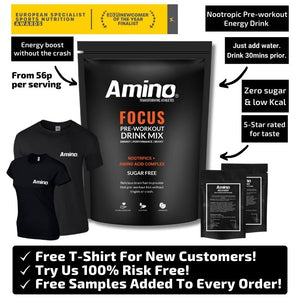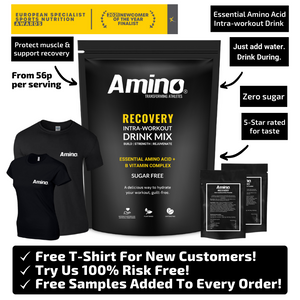Why it’s important?Whether you want to improve your running speed, your focus at work or your energy levels around the clock, your nutrient intake can have a big impact on your performance. In this article, we take a look at the properties of acetyl-l-carnitine, a key nutrient that may give you a vital boost in all areas.
|
A recent study published by the Journal of the International Society of Sports Nutrition found that women who supplemented with a specific blend of nutrients for one month saw their 3-mile run times improve by almost one minute. [1]
One of the key nutrients in the supplement was acetyl-l-carnitine, combined with copper, zinc, iron and phosphatidylserine. In this article, we’ll take a look at acetyl-l-carnitine – a key component of our new pre-workout FOCUS supplement – and its benefits.
What is acetyl-l-carnitine?
Also known as ALC, it’s a form of l-carnitine, a modified version of the amino acid lysine. [2] It is known as a conditionally essential nutrient (CEN) because it can usually be produced by the body in adequate amounts. However, there may be instances where you need to increase the volume in your diet or take a supplement. For instance, if you’re a vegan or vegetarian you may need a helping hand. [3] The daily recommended dosage of acetyl-l-carnitine is 600–2,500mg per day. [4]
Benefits of acetyl-l-carnitine
There are many believed benefits to maintaining healthy levels of ALC. For one thing, it may allow your body to metabolise more efficiently in order to boost your performance. It is known to help the body turn fat into energy by passing fatty acids to the mitochondria (the engines within your cells) so they can be ‘burned’ as fuel. [5]
Acetyl-l-carnitine is may also aid brain function. Carnitine levels decline as we age but some studies have found that supplementation helps to improve cognitive function in people with mild cases of Alzheimer’s Disease. [6] There is also some positive research into ALC’s positive effects on heart tissue. [7]
Researchers studying l-carnitine in humans have also found that supplementation can help with muscle recovery, ‘which can enhance training effects on exercise performance’. [8] Interestingly, studies show that the body can turn ACL into l-carnitine and vice versa, depending on what it needs, so supplementary ACL may aid this process.
In addition, acetyl-l-carnitine is believed to be the most beneficial form of carnitine for the brain, [9] while also being the form most easily absorbed by the stomach.
Sources of acetyl-l-carnitine
Red meat, fish, dairy and poultry are the best sources of ALC, but small amounts can be found in avocados too.
It can also be found in our new FOCUS pre-workout supplement. Blended with caffeine, theanine, alpha GPC, tyrosine and citrulline, it is designed to boost your performance, whether you’re exercising, working or gaming. Plus, because it’s derived from plant-based sources, FOCUS is suitable for vegetarians and vegans.
Get the benefits of ALC
Find out more about our new FOCUS supplement today. With just 18 calories per serving – and available in two delicious flavours – it has zero sugar and will turbocharge your next workout.
References
[1] https://jissn.biomedcentral.com/articles/10.1186/s12970-017-0199-2
[2] https://www.sciencedirect.com/topics/neuroscience/acetylcarnitine
[3] https://www.healthline.com/nutrition/l-carnitine#worth-taking
[4] https://www.healthline.com/nutrition/l-carnitine#dosage
[5] https://www.sciencedirect.com/topics/neuroscience/acetylcarnitine
[6] https://www.sciencedirect.com/topics/neuroscience/acetylcarnitine
[7] https://ods.od.nih.gov/factsheets/Carnitine-HealthProfessional/
[8] https://jissn.biomedcentral.com/articles/10.1186/s12970-017-0199-2
[9] https://pubmed.ncbi.nlm.nih.gov/27100509






